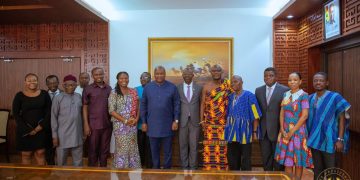Shift in mindset, attitude of Africans needed to make AfCFTA successful – Kwame Pianim
Renowned Economist, Kwame Pianim, has described as aspirational the African Continental Free Trade Area (AfCFTA) agreement.
According to the renowned economist, given the aspirational nature of the trade pact, a major shift in the mindset and attitude of Africans across the continent will be needed to make the AfCFTA hugely successful.
“The AfCFTA is aspirational and need’s a shift in the mindset and attitude from Africans to make it successful.
“Meaning you and I, the various customs across the continent need to make sure that our goods flow and our manufacturers should also know that they are not only going to produce for 33 million Ghanaians but for 1.3bn people and so they will have to scale up.
“When we see soap from South Africa or Zimbabwe we buy that instead of the one from Indonesia or Thailand and when you do that you are exporting job to your brother in another African country,” he stated in an interview on Accra-based Asaase Radio monitored by NorvanReports.
Speaking on the role of government, Mr Pianim noted governments of the various African countries must collaborate to build the requisite infrastructure to support the implementation of the AfCFTA.
The African Continental Free Trade Area (AfCFTA) agreement creates the largest free trade area in the world measured by the number of countries participating. The pact connects 1.3 billion people across 55 countries with a combined gross domestic product (GDP) valued at $3.4 trillion.
The trade pact has the potential to lift over 100 million people out of moderate and extreme poverty,
Read This: Consolidated Fund to be recipient of GHS 6.9bn revenue mobilised from E-Levy
Touching on the subject of the controversial E-Levy, Mr Pianim noted the introduction of the E-Levy in the 2022 Budget Statement by government is a lazy way of mobilising revenue.
According to the renowned economist, the policy is backward and anti-technology.
“First of all, I think it is a very backward step. The mobile money has brought financial inclusion to people in the villages who cannot go to the bank and open a bank account.
“You know what MTN and others are doing? They go to the bank and open an E-wallet for you. We don’t control it: they do. They count it as if it is their money. It is not their money.
“A little bit more consultation would have shown the government that don’t go there. You want to raise GHC6 billion? Is GHC6 billion worth undermining the … effort that this government has put in digitalising things?” he asked.
“It is a lazy way of sitting in the air conditioning in Ministry of Finance and saying, ‘Oh I want money, oh let me grab this.’ The Ministry of Finance is not a budget and expenditure ministry; it is for development, it is for finance. So you are looking at what will grow the economy, not what will give you money,” he added.
Pianim called on the government to cut down on its expenditure and find other, innovative ways of raising revenue.








